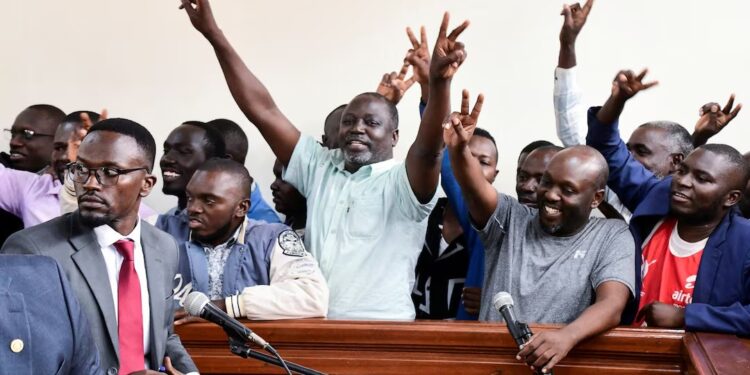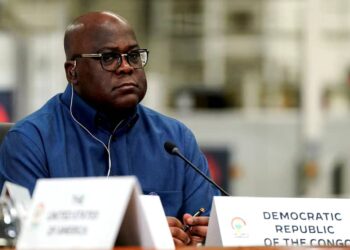By Enyichukwu Enemanna
Opposition figures in Uganda have staged a protest after the deportation of their colleagues from the neighbouring Kenya, where they had travelled for a training course.
Kenyan authorities on July 23 detained 36 members of Uganda’s opposition Forum for Democratic Change (FDC) while participating in the course, their lawyers have alleged.
They were subsequently deported to Uganda where they have been charged with terrorism-related offences since last week, charges they denied, their lawyers added.
On Monday, 14 opposition officials and supporters had marched through Ugandan capital, Kampala towards the Kenyan embassy to protest against Nairobi’s decision to detain and deport their colleagues.
They were however arrested and detained by the police.
The arrests on Monday and deportation last month is coming at a time both Kenya and neighbouring Uganda have faced anti-government demonstrations by youth and opposition activists.
The 14 lawmakers were demonstrating against the treatment of their colleagues and were arrested “for participating in unlawful assembly activities,” police spokesperson Patrick Onyango said.
They were later charged in a magistrate’s court with being “a public nuisance,” according to a charge sheet sighted by Reuters.
They all pleaded not guilty.
Four of the accused were released on bail while the rest were remanded to prison. They are to reappear in court on Aug. 7, according to an FDC official who was in court.
Opposition critics and human rights campaigners have long accused President Yoweri Museveni’s government of using fabricated charges to clamp down on his opponents. Government officials deny this.
Museveni, 79, has led the East African country of 46 million since 1986.
Heritage Times HT reports that countries in Africa have witnessed a wave of social unrest in recent times.
A high court in Ghana approved a request by the police to ban a handful of organisations from carrying out protests planned between July 31 and August 6 after the police said it lacked the personnel necessary to provide security as officers have been deployed to political rallies amid election campaigning for elections.
Some civil society groups had planned embark on a street demonstration against the escalating cost-of-living in the West African nation.
Kenya was one of the earliest countries to be hit by the wave of protest, where over 50 people were killed and nearly 700 arrested in a police crackdown on demonstrations since mid-June.
Young persons began taking to the streets to oppose tax increases proposed by President William Ruto. It later snowballed, leading to the sack of cabinet members by Ruto to reduce governance cost.
In Uganda, young persons took to the streets to protest against alleged corruption and demanded the resignation of the parliament speaker.
Police there shut down a march and arrested more than 70 people, according to a legal aid organisation.
In Nigeria, President Bola Tinubu ordered an end to anti-government protests tagged, #EndBadGovernance which seeks to draw the attention of government on the growing poverty in the country, high cost of goods and services and soaring prices of staple foods.
He instead urged the organisers to seek dialogue to end what he termed politically motivated demonstrations.



































